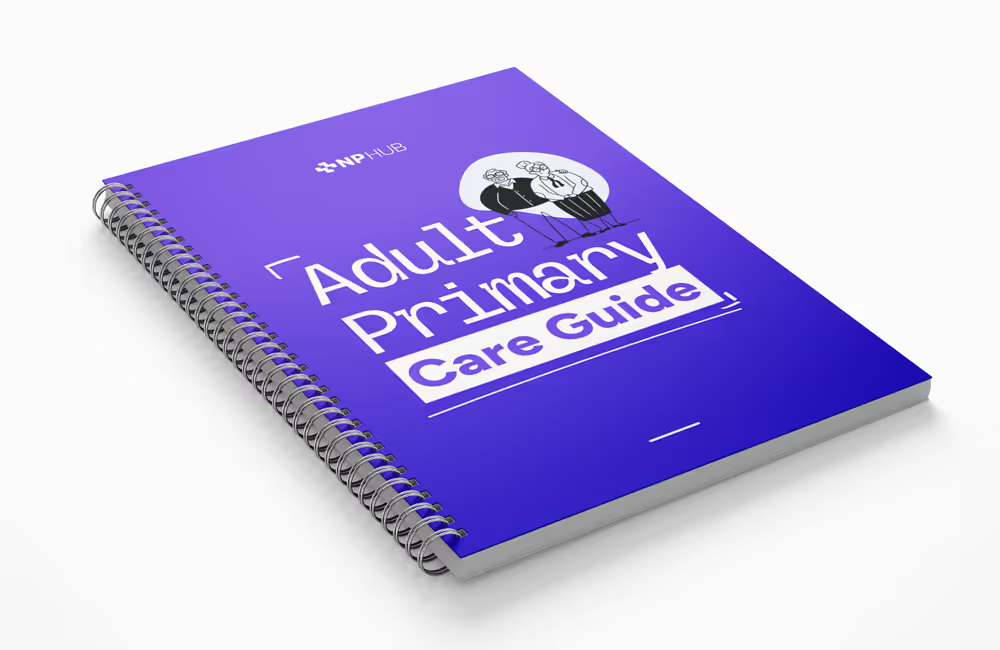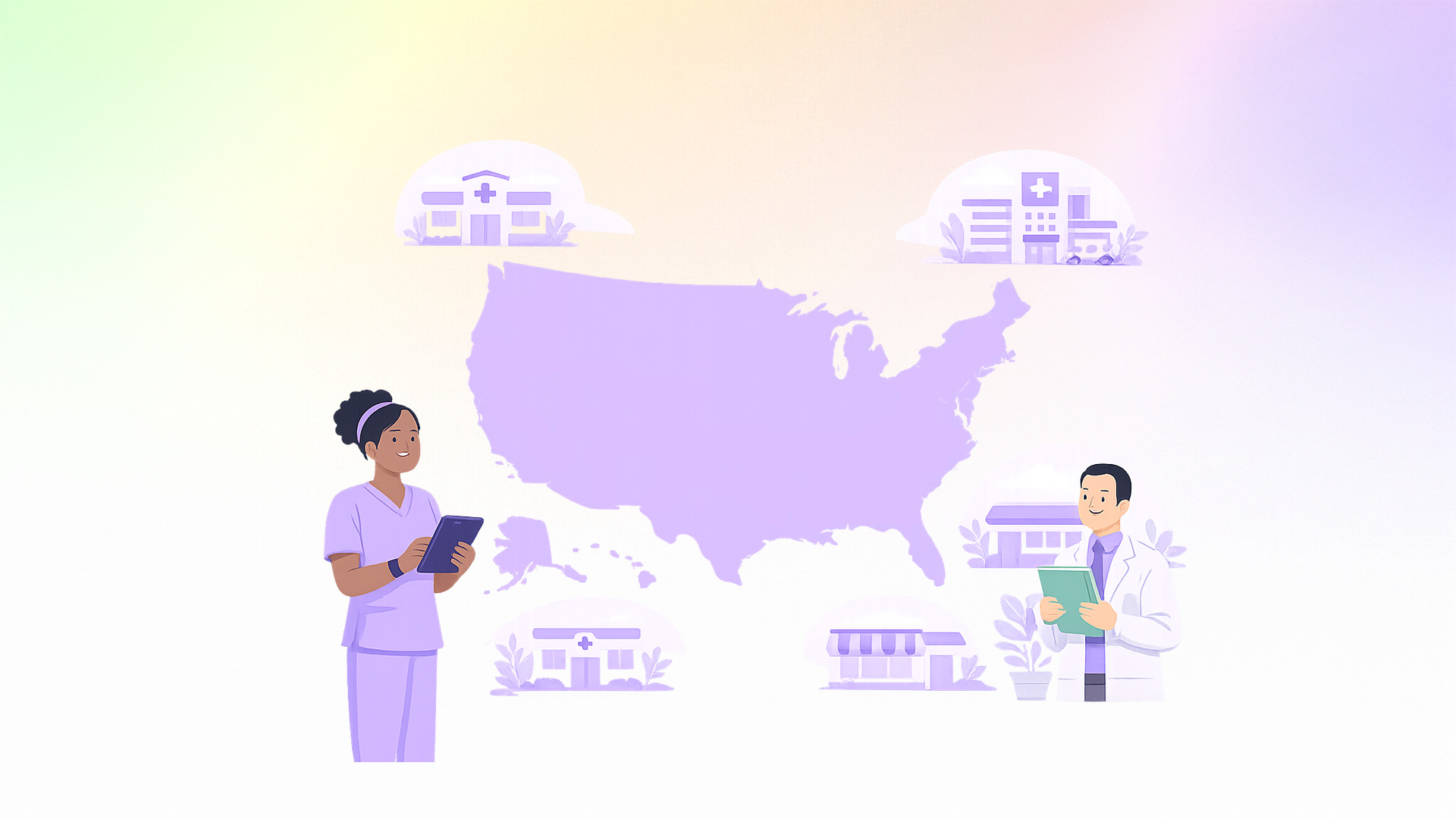The world's population is aging at an unprecedented rate, and nurse practitioners will play a pivotal role in helping care for the elderly. By 2026, as baby boomers reach the age of 80, it is expected that more than 20% of Americans, almost 80 million people, will be over 65, which is the primary demographic for adult primary care. This dramatic shift in population demographics presents challenges and opportunities for healthcare providers, particularly nurse practitioners.
With their advanced training and unique skill set, NPs are well-equipped to provide comprehensive, patient-centered care to adults who, more than anyone, need NPs’ compassion. In this context, NPs aim to help the adult population prevent chronic diseases through a holistic approach, focusing on the patient's physical, mental, emotional, and social well-being.
However, providing effective adult primary care requires a deep understanding of the unique challenges and considerations in treating this diverse patient population.
To support NP students and new graduates in their journey to become confident and skilled healthcare professionals, we created a guide in partnership with Dr. Sandra Pagenta, DNP, APN-BC. This handbook is packed with her insights, strategies, and evidence-based practices to help you provide the best care possible for adult patients.
You can download the guide for FREE by clicking here.

Now, in this blog, we’ll explore the importance of adult primary care, discuss common challenges faced by NP students, and provide the tools you need to enhance your clinical skills and knowledge when treating elderly patients.
The Vital Role of NPs with Elderly Patients
Impact of Well-Prepared NPs on Patient Outcomes and Satisfaction
As the demand for adult primary care services continues to grow, the role of well-prepared NPs in ensuring positive patient outcomes and satisfaction cannot be overstated. NPs who receive quality education, the proper guidance, and support will not only improve health outcomes but also improve their quality of life.
With their skills and knowledge, NPs can create a lasting impact by promoting patient education and preventive care.
How NPs Address the Physician Shortage
The United States is facing a significant shortage of primary care physicians. As more states realize NPs' potential, they will become key players in addressing this shortage by providing accessible, high-quality primary care services in various settings.
NPs have the skills to diagnose and treat common health conditions, prescribe medications, and order and interpret diagnostic tests. By working collaboratively with physicians and other healthcare providers, NPs can help ensure that the growing population of adult patients receives the care they need to maintain optimal health and well-being.
Increasing Complexity of Adult Primary Care Due to an Aging Population
As the population ages, the complexity of adult primary care continues to increase. Older adults often present with multiple chronic conditions, take numerous medications, and require more frequent and intensive healthcare services than younger patients.
NPs who specialize in adult care must be prepared to manage a wide range of health conditions, from diabetes and hypertension to cognitive impairment and functional decline. They must also be skilled in addressing the unique psychosocial and emotional needs of older adults, as well as coordinating care with specialists and other healthcare providers.
Common Challenges Faced by NP Students
Transitioning from the classroom to clinical practice can be a daunting experience for many NP students. While NP programs provide students with a solid foundation of theoretical knowledge and clinical skills, applying this knowledge in real-world settings can present a unique set of challenges.
One of these challenges includes addressing a variety of medical concerns specific to the elderly population, particularly those aged 65 and older, showcasing the importance of expertise in senior care services.
If patients have not heard back within two weeks of their tests, they are encouraged to contact the office to ensure timely communication regarding abnormal lab and x-ray results.
Feeling Unprepared and Nervous When Transitioning
One of the most significant challenges NP students face is feeling unprepared and nervous when transitioning from the classroom to clinical settings.
Despite having completed rigorous coursework, many students experience anxiety and self-doubt when faced with the responsibility of caring for real patients. This includes providing care for newborns, emphasizing the inclusivity of services from the earliest stage of life.
This is particularly true in adult primary care, where patients often present with complex health histories and multiple chronic conditions. NP students may worry about their ability to effectively assess, diagnose, and treat these patients, leading to increased stress and anxiety.
To gain practical experience and build confidence, NP students are encouraged to make an appointment for medical services.
Struggling to Implement Theoretical Knowledge into Practice
Another common challenge for NP students is the struggle to translate theoretical knowledge into clinical practice.
While NP programs provide students with a strong foundation, applying this knowledge in the fast-paced, unpredictable environment of a clinical setting can be challenging. Urgent care services are crucial for patients seeking immediate medical attention when their regular healthcare provider is unavailable.
NP students may find themselves grappling with adapting their theoretical knowledge to the unique needs and preferences of individual patients and navigating the complex social and cultural factors that influence patient health behaviors and outcomes.
Lacking Confidence in Clinical Skills and Decision-Making
Another significant challenge is a need for more confidence in clinical skills and decision-making. Students may feel uncertain about their ability to perform physical exams, interpret diagnostic tests, and make accurate diagnoses and treatment plans.
The Emotional Labor of NP Work with Older Adults
Your stethoscope may listen to hearts, but your presence often holds them together.
As if juggling clinical complexity wasn’t enough, Nurse Practitioners (NPs) caring for older adults are also the steady hand during life’s most delicate moments, when conversations shift from treatment plans to quality of life, from medications to memory loss, from prognosis to peace.
Older patients often arrive with more than just a chart full of comorbidities. They come with decades of stories, deep relationships, and families who are scared, grieving, and overwhelmed. And NPs? You’re right there in the middle, translating medical terms into comfort, advocating for dignity, and carrying a kind of emotional weight no lab test can measure.
Whether it’s helping a family decide on hospice care, supporting a patient through cognitive decline, or witnessing the quiet goodbye of someone you’ve cared for over many visits, it’s emotionally draining. And it’s rarely talked about.
This is why resilience isn’t a buzzword; it’s a lifeline. It’s why peer support, mentorship, and regular self-care aren’t luxuries, they’re survival tools. Because in this field, burnout isn’t just about being tired. It’s about feeling like you’ve got nothing left to give when giving is literally the job.
If you’ve ever cried in your car after a shift, questioned your ability to keep doing this, or just needed someone to say “same,” know this: you are not alone.
Tech-Savvy, Care-Ready: How NPs Are Leading the Digital Transformation in Adult Primary Care
The stethoscope has gone digital, and Nurse Practitioners (NPs) are at the forefront of this tech-driven evolution in adult primary care.
An office visit is now crucial for discussing digital transformation and its impact on patient care. From telehealth consultations to remote patient monitoring, technology is not just a tool but a partner in delivering comprehensive care to our aging population.
Telehealth: Bridging Distances, Enhancing Access
Telehealth has emerged as a game-changer, especially for older adults who may face mobility challenges or reside in remote areas.
Through secure video consultations, primary care providers, including NPs, can assess, diagnose, and manage chronic conditions without the need for patients to leave their homes. This approach not only increases access to care but also reduces the risk of exposure to infectious diseases, a crucial consideration for our senior patients.
Telehealth services support patients in maintaining good health by facilitating ongoing care and fostering strong relationships between patients and their healthcare providers.
Remote Patient Monitoring: Keeping a Watchful Eye
Remote patient monitoring (RPM) technologies enable continuous tracking of vital signs such as blood pressure, glucose levels, and heart rate.
Coordinating treatment plans effectively among healthcare providers ensures that the data collected through RPM is utilized to its fullest potential, enhancing patient care. For NPs, this means real-time data to inform treatment decisions, early detection of potential health issues, and timely interventions. Patients benefit from a proactive care model that supports independence while ensuring safety.
The expertise of healthcare providers in utilizing remote patient monitoring technologies further enhances the quality of care delivered.
Electronic Health Records: Streamlining Care Coordination
Electronic Health Records (EHRs) have revolutionized the way NPs document, access, and share patient information.
With integrated EHR systems, care coordination among multidisciplinary teams, including primary care providers and specialists, becomes seamless, reducing redundancies and enhancing the quality of care.
For older adults with complex health needs, this means a more cohesive and personalized care experience.
Embracing the Digital Shift
As technology continues to evolve, NPs are uniquely positioned to lead the integration of digital tools into internal medicine and adult primary care.
By embracing these innovations, NPs not only enhance their practice but also empower patients to take an active role in their health journey.
The importance of wellness care through regular physical exams and screenings cannot be overstated, as it plays a crucial role in holistic health management and enhancing the patient experience.
The Good News…
At NPHub, we understand the challenges NP students face when adjusting to a clinical setting and the need for these skilled healthcare professionals to care for this growing population.
That's why we've partnered with Dr. Sandra Pagenta, DNP, APN-BC, to create a comprehensive guide designed to help you build confidence, enhance your clinical skills, and provide exceptional care to your adult patients.

Dr. Sandra Pagenta is a seasoned NP with over 15 years of experience in various specialties, including Oncology, Neurosurgery, Radiation, Gastroenterology, and Urology. With her extensive clinical experience and passion for adult primary care, she understands the unique challenges and opportunities that NP students face when entering this field.
This handbook is packed with pro tips and proven strategies for thriving in a clinical setting and providing exceptional care for older people. You’ll learn…
- Health promotion and disease prevention strategies
- Conducting thorough assessments tailored to older adults
- Identifying normal findings and potential red flags
- Staying current on immunization guidelines
- Presenting cases effectively to preceptors
- Diagnosing and managing common adult health conditions
With the guidance of Dr. Sandra Pagenta, you will…
- Build the confidence needed to wear your scrubs and provide quality care to those who need it
- Refine your clinical skills and gain a competitive edge in your career
- Improve patient health outcomes and their quality of life
Whether you're preparing to enter your rotation as an NP student or the workforce as a new graduate, this handbook is an invaluable resource that can help you navigate the challenges of adult primary care. So why wait?
Download your FREE copy today and take the first step to becoming a more skilled NP.
Conclusion
Adult primary care is a complex and growing field that requires skilled, compassionate, and well-prepared nurse practitioners. NPs will play a crucial role in ensuring that older adults receive the care they need to maintain optimal health and quality of life.
To help NP students and new graduates navigate the challenges of transitioning from the classroom to clinical practice, we've partnered with experienced NP Dr. Sandra Pagenta to create a comprehensive guide that provides the expert guidance, practical strategies, and evidence-based practices you need to excel in your adult primary care rotations and beyond.
Frequently Asked Questions
1. Why does working with older adults feel so emotionally exhausting sometimes?
Because you’re not just treating conditions — you’re bearing witness to aging, decline, and sometimes, death. Minimizing patient phone calls during the process of accessing healthcare services can help reduce some of this emotional burden.
You’re navigating conversations that are as emotional as they are clinical, and that takes a toll. It’s perfectly normal to feel drained. Compassion is powerful, but it’s not limitless without replenishment. Specialized care tailored to the unique healthcare needs of women, including services related to preventive care, reproductive health, and wellness, is essential in creating a supportive environment.
2. Is it normal to cry after a tough day or patient interaction?
Yes. 1000 times yes. Crying isn’t a sign of weakness — it’s a sign you care deeply. Processing those emotions is healthy. Holding them in? Not so much. The emotional labor you carry deserves acknowledgment, not shame.
The office serves as a central location for appointments and consultations, providing a space where patients can access personalized medical services.
Surgery is a critical component of specialty care, ensuring comprehensive treatment through collaboration between primary care and surgical services.
3. How can I avoid burnout while still giving my all to patients?
Boundaries, peer support, and self-care routines aren’t “soft skills” , they’re survival strategies. The ongoing evaluation and management of chronic conditions, including asthma, are crucial for maintaining overall health.
Schedule regular mental check-ins, connect with a mentor or a colleague who gets it, and don’t hesitate to seek out therapy. Family medicine plays a vital role in providing comprehensive care for patients of all ages, ensuring that you can’t pour from an empty cup.
4. How do I handle tough conversations about death, dementia, or end-of-life care with families?
Gently, honestly, and with empathy. Internal medicine plays a crucial role in providing comprehensive care during these tough conversations. It’s okay to not have all the answers. Families often need space to process and someone to guide them, not just with facts, but with compassion. Being present and listening is often more impactful than trying to fix everything.
Emphasizing the importance of wellness care through regular physical exams and screenings can also enhance the patient experience and promote holistic health management.
5. What if I feel like I’m the only one struggling emotionally in this job?
You’re definitely not alone. Many NPs feel this way, they just don’t always talk about it. Emotional struggle in this line of work is common, even expected. Primary care providers, including doctors specializing in family medicine, internal medicine, and sports medicine, play various roles in delivering personalized, patient-centered care.
You’re part of a quiet, strong community doing incredibly hard and meaningful work to meet the unique healthcare needs of patients.
Find a preceptor who cares with NPHub
Book a rotation.webp)








.webp)


.webp)



%20(3)%20(2).svg)
.webp)